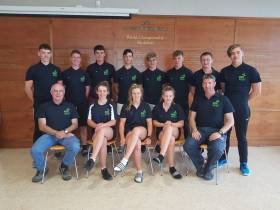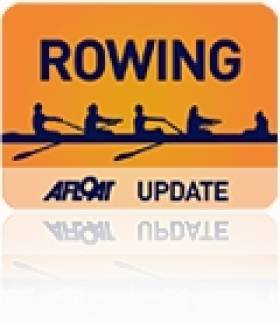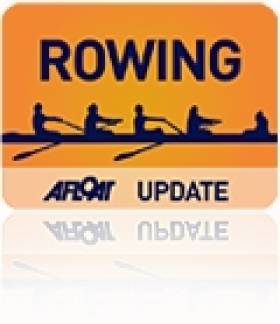Displaying items by tag: Coupe
#Rowing: Britain won the first race of the Coupe de la Jeunesse 2018 at the National Rowing Centre in Cork. The junior women’s eight, the traditional starting event for the event, featured five boats. Spain and France took the minor medals, while Ireland took fourth. The Coupe continues until Sunday.
Coupe de la Jeunesse, National Rowing Centre, Day One
Junior Women’s Eight – Final: 1 Britain 7:04.9, 2 Spain 7:07.1, 3 France 7:07.7; 4 Ireland (A Tyther, R O’Donoghue, C O’Sullivan, J Duggan, J Harrington, E Murphy, E Carney, C Nic Dhonncha; cox: V Hanlon) 7:15.5.
Coupe Fifth Place for Ireland Rowing Four
#Rowing: The Ireland junior men’s four finished fifth at the Coupe de la Jeunesse in Hazewinkel in Belgium. Britain showed impressive speed and won the A Final well, with Belgium taking silver and Portugal a surprise bronze. The Czech Republic and the Ireland crew of Aaron Johnston, Ross Corrigan, Barry Connolly and Nathan Timoney, were just behind this group.
Coupe de la Jeunesse, Hazewinkel, Belgium – Day Two (Irish interest)
Junior Men
Four – Heat One: 2 Ireland (A Johnston, R Corrigan, B Connolly, N Timoney) 6:29.73. A Final: 5 Ireland 6:22.36.
Quadruple – Heat One: 1 Ireland (B O’Flynn, M Dundon, J Keating, J Quinlan) 6:20.92.
Junior Women
Single – Heat: 1 Ireland (G O’Brien) 6:21.42.
Ireland Strike Gold at Coupe de la Jeunesse Rowing
#ROWING: Ireland crews had another very good day at the Coupe de la Jeunesse junior rowing tournament in Bordeaux in France today. The highlight was a gold medal for the Ireland quadruple of Colm Hennessy, Eoghan Whittle, Patrick Munnelly and Andrew Goff. The men’s double of Conor Carmody and David O’Malley and the women’s pair of Oisin and Dervla Forde both took silver, as they had on Saturday.
Coupe de la Jeunesse 2014, Bordeaux (Finals, Irish interest)
Saturday
Men
Pair – A Final: 1 France 6:43.72; 3 Ireland (B Keohane, D Keohane) 6:51.36.
Quadruple Sculls – B Final: 1 Ireland (C Hennessy, E Whittle, P Munnelly, A Goff)
Double Sculls – A Final: 1 Hungary 6:25.35, 2 Ireland (C Carmody D O’Malley) 6:28.39.
Women
Pair – A Final: 1 Spain 7:29.19, 2 Ireland (O Forde, D Forde) 7:34.68.
Quadruple Sculls – B Final: 1 Ireland (K Turner, A O’Keeffe, C Beechinor, E Hegarty) 6:53.88.
Double Sculls – A Final: 1 Italy 7:05.55; 3 Ireland (E Lambe, J English) 7:10.30.
Single Sculls – B Final: 3 E Barry.
Sunday
Men
Pair – A Final: 1 Italy 8:47.20; 4 Ireland (Keohane, Keohane) 8:53.19.
Quadruple – A Final: 1 Ireland (Hennessy, Whittle, Munnelly, Goff).
Double – A Final: 1 Hungary 6:35.55, 2 Ireland (Carmody, O’Malley) 6:38.19.
Women
Pair – A Final: 1 Spain, 2 Ireland (Forde, Forde)
Quadruple – B Final: 1 Austria 6:58.56, 2 Ireland 6:58.81
Double – A Final: 1 Italy 7:16.86; 4 (Lambe, English) Ireland 7:24.33.
Single - E Barry withdrew (medical)
# ROWING: Ireland’s Brooke Edgar and Aoife Cooper, who took silver on Saturday, had to settle for fourth in the pairs race at the Coupe de la Jeunesse in Spain today. They were challenging for second until the closing stages, but Italy and Britain took the silver and bronze behind Spain, who led all the way down the course.
The Ireland men’s four and double scull took sixth, while the men’s quadruple were second in their B Final and the women’s quadruple third in theirs.
Coupe de la Jeunesse, Banyoles (Day Two, Irish interest)
Men
Four – Heat Two: 3 Millar/Seaman/Tolan/Egan 6:32.73. A Final: 6 Ireland 6:51.07.
Sculling, Quadruple – Heat One: 4 Ireland 6:16.04. B Final: 2 Ireland 6:22.74
Double – Heat Two: 1 Griffin/Quinlan 6:46.38. A Final: 6 Ireland 7:00.90
Women
Pair – Heat Two: 2 Edgar/Cooper 8:05.60. A Final: 4 Ireland 7:50.47.
Sculling, Quadruple – Heat One: 5 Ireland 7:14.80. B Final: 3 Ireland 7:15.96.
Ireland Strike Gold at Coupe de la Jeunesse Rowing
Ireland’s men’s pair of Joel Cassells and Chris Black and women’s double of Katie Cromie and Shelly Dineen both won on the first day of the Coupe de la Jeunesse in Austria, a European tournament for juniors. The men’s double scull of Matthew Monteith and Adrian Sheehan was second and the men’s four third.































































